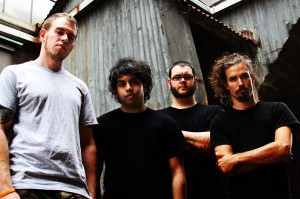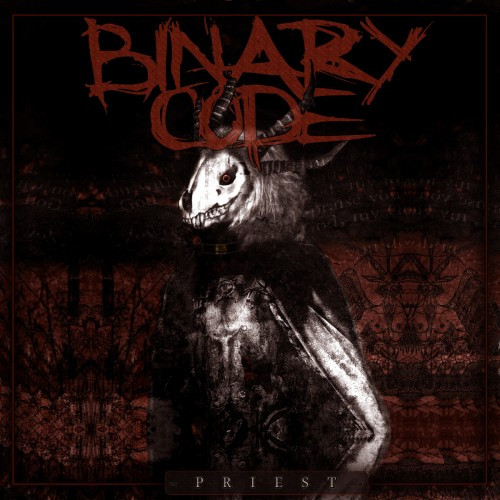We’ve made no secret about our admiration for The Binary Code. We thought their 2009 debut album, Suspension of Disbelief, was a remarkably accomplished work, both in conception and in execution (our review of that album can be found here).
In an interview that accompanied our album review, we found the band’s guitarist and co-songwriter Jesse Zuretti to be an unusually thoughtful and engaging dude. And when we finally got to see The Binary Code play live, as part of the METAL AS ART tour in January, we were blown away by the band’s maturity on stage and the intensity of their performance (as we said here).
So with all that, it should come as no surprise that we’ve been eagerly awaiting the band’s new EP, Priest, which is scheduled for official release on August 10. We’ve now been lucky enough to get an advance listen to the three songs on the EP (and a bonus “alternate” version of one of those songs that’s also included).
Our confidence in this band’s future was not misplaced. Priest represents another step forward for a band that was already bursting with talent and exceptional creativity. The more we’ve listen to Priest, the more we’ve found in it, and the more impressed we’ve become. This is the kind of music that engages on both a visceral and a cerebral level — it kicks like a pissed-off mule and makes you think at the same time. (more after the jump . . .)
 We find ourselves in a place similar to where Suspension of Disbelief left us — not wanting to review this release song-by-song (which is usually an exercise in tedium) but not knowing of any good way to sum up the music as a whole without sacrificing the fascinating variation that makes the release so noteworthy. At least this time there are only three songs to be addressed separately.
We find ourselves in a place similar to where Suspension of Disbelief left us — not wanting to review this release song-by-song (which is usually an exercise in tedium) but not knowing of any good way to sum up the music as a whole without sacrificing the fascinating variation that makes the release so noteworthy. At least this time there are only three songs to be addressed separately.
Priest begins with an instrumental called “Ocean of Light”. For anyone familiar with Suspension of Disbelief, it will be a surprise.The band has eased up on the gas pedal but added monolithic, down-tuned weight to the sound. It begins as a massively heavy, ominous slab of post-rock pounding, enlivened with a recurring melodic lead — and then it comes to a dead stop, followed by a second of complete silence, which serves as a bridge to a completely different rhythm and riff, only to be followed by the return of the original dreadnought avalanche.
The title track follows, and it’s more in line with the style of Suspension, except even more assured and cohesive in the songwriting. The song is built around a few dominant riffs — including a memorable 5-note, minor-key passage that reappears often enough to anchor everything else that happens. Once those foundational riffs are announced at the outset, the rest of the song progresses through one improvisational variation on those themes after another, accompanied by an equally inventive progression in Umar Fahim‘s drum rhythms and fills, and Meshuggah-esque start-stop hammering in the bass line.
 There are vocals on this song and the one that follows, and Mike Apprich belts them out in tight coordination with the polyrhythmic tempos. His mixture of deep growls and penetrating shrieks adds an element of chaotic violence to the tightly coordinated instrumentals.
There are vocals on this song and the one that follows, and Mike Apprich belts them out in tight coordination with the polyrhythmic tempos. His mixture of deep growls and penetrating shrieks adds an element of chaotic violence to the tightly coordinated instrumentals.
The third song is called “Encircled”, and it’s even more technically over-the-top than “Priest”. The first two and a half minutes are a tour-de-force of constantly shifting riffs and head-swirling drums, and then the rhythm changes and the guitar lead begins to swirl, backed by a fascinating new drum line.
We don’t know enough about what causes a guitar to make this kind of swirling sound, but the technique is reminiscent not only of passages in “Suspension of Disbelief (Part II)” from this band’s first album but also the technique (though not the melody itself) employed on the memorable lead in “Oroborus” by the awesome Gojira. However Jess Zuretti makes that sound on his guitar, it’s fucking addictive.
As that swirling sound continues, a second guitar track joins in, voicing a slower, anthemic melody — until all the instruments give way to a contemplative piano solo that carries the song to its conclusion. That piano melody doesn’t have a tacked-on feel, as is so often true of instrumental outros. As dramatically different as it is from all that comes before, it still fits. It’s the final step in a cohesive musical progression.
One song left: The last track on the EP just made me laugh out loud, until I listened a few more times. It’s an electronic version of “Priest” that mimics the musical sounds from first-generation video games like Mario Bros. that debuted on the 8-bit Nintendo game console. It’s an amazingly accurate reproduction of the instrumentation on the original song, right down to Umar Fahim’s double-bass kicks, blast beats, and cymbal crashes — except it’s Mario Bros. tonality. It’s almost like a simplified blueprint of all the complexity built into the title track, aurally sketched with a kazoo.
 Who knows what prompted this screwball variant of a compelling song? About all we can say is that if anyone were to wonder whether Jesse Zuretti and Umar Fahim have a sense of humor, the Nintendo version of “Priest” is the answer to that question.
Who knows what prompted this screwball variant of a compelling song? About all we can say is that if anyone were to wonder whether Jesse Zuretti and Umar Fahim have a sense of humor, the Nintendo version of “Priest” is the answer to that question.
With the songs on Priest, The Binary Code are once again walking through genre walls as if they weren’t there. Priest is powerful, punishing, technically complex, compulsively groovy, wildly inventive, and absolutely engrossing. Its only flaw is that it’s too damned short.
Our usual practice when we review an album is to put up one song for you to hear. But in this case, MetalSucks is currently featuring an exclusive stream of the EP’s title track, and we ain’t gonna fuck up that arrangement. You do owe it to yourself to check out the song — but you’ll have to follow this link to do it.
Priest will be officially released by the band on August 10. You can pre-order Priest here as a digital download, or as a download and t-shirt package.
One final word: We will have another interview with Jesse Zuretti to post in the coming days, so watch for it. If it’s anything like the first one we did with him last December, it will be worth your time.


“And make sure there are no small animals or children nearby, because you might accidentally melt their brains.”
Well, my cat seems fine. Or rather, the same as before I hit play.
As for the song, it’s not bad. I’ll have to check out a couple more songs from The Binary Code before I decide whether this is a band I can listen to more than once or twice. A 8-bit sounding version of “Priest” sounds intriguing and I should try to hear that at least once.
I won’t nitpick over your calling the NES a first generation console though. I’m usually above that sort of behavior.
Well, when it comes to game consoles, I really don’t know what the fuck I’m talking about. I think the last video game I played was PONG. So feel free to nitpick and/or educate. I do know that funky sound, but I do not know the technology.
As for The Binary Code, there are some similarities with 7th Nemesis, who I know you like, particularly on Suspension of Disbelief.
Ah, I’m just fuckin’ with you. Been one of those days. Actually, past couple days have been like that.
But… the NES was the first of the “third generation” consoles. However, some of the stuff before were dedicated systems with built in games only, as in the first generation. Second generation was where the “console” as gamers know it got its real start, namely with the Atari VCS (aka the Atari 2600) and the Intellivision, among many others, but they weren’t the first. Granted, lumping consoles/settops/etc. into “generations” isn’t an exact science and there is some overlapping.
What can I say? I’ve been playing video games for a long time. But back to the music, I’m willing to give these guys a chance, so I’ll hit up their myspace (or whatever other online presence they have) this weekend and see what they have to offer.
Well, I clearly needed to do more research before I called that 8-bit Mario Bros console a “first generation.” I just can’t get away with any sloppiness on this site — which is a good thing! You in particular ought to listen to the variant version of “Priest” sometime and let us know what you think. Or not.